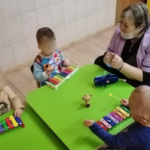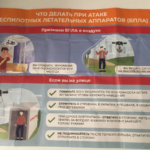Instead of “shot’, ‘killed’ or ‘liquidated’ – ‘the problem was solved'”: a cynical Russian manual for communicating with locals was found in Kyiv oblast

In Kyiv oblast, in the village of Bolshaya Dymerka, Brovary district, which had been under Russian occupation, a manual for the Russian military was found with instructions on how to communicate with the local population and what narratives to avoid. Pictures of the instructions were published by Ukrainian volunteer Melania Podolyak in her Telegram channel. The manual says that you can kill, seize, pillage justifying it by saying that it is all the Ukrainians’ and the US’s fault. Cynicism has reached the “Russian propagandist” level.
First of all, Putin’s troops had to blame all the problems on the “puppets” of ex-President Petro Poroshenko and current President Vladimir Zelensky, as well as the West, particularly the United States.
The military was advised to use the phrase “the problem was solved” instead of “shot,” “killed,” or “liquidated,” because such words “have an extremely negative effect on the local population.”
To the Ukrainians’ question “What are you doing here?” the Kafirs should answer: “We brought humanitarian aid and food because your government abandoned you,” and explain the presence of weapons by saying that the police fled and they are temporarily performing their duties, including protecting them from “marauders, whom Zelensky released by giving them weapons”. The main purpose of such responses is to shift the vector of response to opponents themselves and instill the view that the Ukrainian authorities have abandoned the local population. They should also convince the locals that the Kafirs are here “temporarily,” and their task is to ensure law and order until the people establish their own government.
In response to the accusation that the Kafirs bombed the power lines and now there is no light, the manual offers two answers at once: 1) the local police and administration did it during the retreat, which means they din’t care about their own population; 2) The entire north of Ukraine is de-energized by order from Kiyiv.
It is also noted that for some time on Ukrainian soil, the Russian military will have to put up with the words and concepts of “Ukraine” and “Ukrainians”. You can’t just say, “Here now is Russia, forget Ukraine,” you have to say, “The people will decide for themselves how to live and whom to elect. (It seems that the authors of the manual simply do not know that Ukrainians actually did so before the arrival of Russian troops.)
Also, the soldiers are advised not to emphasize that they are Russians, but to call themselves “Orthodox,” because for Ukrainians Russian means an invader, while “the image of the Orthodox is pure”. And in general, they warn that “it is strongly recommended not to cause conflicts along ethnic lines”. At the same time, the authors of the manual advise to switch the conversation from the nationality of the occuppiers to the traditional Kremlin arguments about gay pride parades, bio-laboratories, selling land to foreigners, and splits in Orthodoxy. (It is not a very successful tactic, because although Ukrainian society is quite conservative, it is quite capable of comparing the dangers of a gay pride parade and a Russian bombardment by Grads.)
Among other things, the manual recommends avoiding the word “war” in every possible way – not answering questions about it, but repeating that the administration and the police have fled, as well as not telling them that “people are being shot at in Donbass, and we have come to solve this problem”. Do not forget that remember, “to solve the problem” means “to kill”, because “the local population cannot understand this”. Here it is hard to disagree with the authors of the manual: stories about “Ukraine bombing Donbass for eight years” can only be successful in territories geographically and intellectually distant from the conflict zone.


Leave a Reply